What if eating differently could not only slow your brain’s aging, but actually reverse it—and women stand to gain even more than men?
Story Highlights
- Recent studies reveal nutrients like D-serine and ketones may reverse some brain aging markers.
- The green-Mediterranean diet delivers significant cognitive benefits, with women benefiting most.
- Breakthroughs from 2021–2024 show dietary interventions can impact neuroinflammation and metabolic dysfunction driving brain aging.
- Experts see a turning point: nutrition may soon be a frontline defense against age-related cognitive decline.
Targeted Nutrition: The New Frontier in Brain Aging
Researchers across disciplines have honed in on a startling premise: certain nutrients and dietary patterns do more than slow cognitive decline—they can actually reverse aspects of brain aging. The DIRECT PLUS trial, led by teams from Harvard, Ben-Gurion University, and Leipzig, stands out. Their results, published in 2024, show that the green-Mediterranean diet, rich in plant-based foods, nuts, and polyphenols, reduced protein biomarkers associated with aging in the brain. Women in the trial saw even greater improvements, igniting a wave of inquiry into sex-specific nutrition strategies.
Why do women respond so well to these interventions? Scientists hypothesize that hormonal differences and unique metabolic pathways amplify the effects of anti-inflammatory and neuroprotective nutrients. Trials consistently find that female participants gain more cognitive resilience, suggesting that personalized nutrition could become a reality for aging adults—especially women. The implications are profound: dietary patterns might soon rival pharmaceuticals in their power to preserve and even restore brain health.
Breakthrough Molecules: D-serine and Ketones
Beyond dietary patterns, new research highlights the role of specific molecules in brain rejuvenation. In 2024, a PLOS Biology study identified Menin—a protein that declines with age—as a key driver of neurodegeneration. Supplementing with D-serine, a naturally occurring amino acid, restored Menin levels and reversed cognitive decline in aging mice. While human studies are just beginning, the results have sparked optimism among leading neuroscientists.
Meanwhile, a PNAS study explored the effects of exogenous ketones—compounds produced during fasting or low-carb diets—on aging adults. By bypassing age-related insulin resistance, ketones stabilized brain network activity and improved cognitive performance for both men and women. These findings suggest that targeted supplementation could complement dietary changes, offering another layer of defense against brain aging.
Why Timing and Personalization Matter
Timing is crucial in maximizing the benefits of nutrient-driven interventions. Large-scale studies now pinpoint midlife as a critical window for preventing and reversing cognitive decline. As neuroimaging and molecular tools grow more sophisticated, researchers are able to track subtle shifts in brain health and fine-tune interventions for maximum impact. Personalized strategies, tailored to sex, genetics, and lifestyle, are on the horizon—potentially transforming how we approach aging.
Even so, experts caution against one-size-fits-all solutions. The magnitude and duration of benefits, as well as optimal dosing, remain under investigation. While the green-Mediterranean diet and molecules like D-serine show immense promise, the translation from animal models to long-term human outcomes is ongoing. Nonetheless, the shift from managing decline to actively reversing aging signals a seismic change in how science and society view brain health.
Societal Impact: Redefining Aging and Health Economics
The ripple effects of these breakthroughs extend far beyond clinical trials. Aging populations face skyrocketing rates of dementia and cognitive impairment, straining healthcare systems worldwide. If nutrition-based strategies can deliver even modest improvements in brain aging, the economic and social benefits could be enormous. Reduced healthcare costs, increased productivity, and improved quality of life for millions are within reach.
The nutraceutical industry is already responding, with a surge in demand for supplements and functional foods targeting brain health. Policymakers and public health leaders are watching closely, poised to update guidelines and recommendations as evidence mounts. For now, the consensus is clear: dietary interventions are safe, accessible, and potentially transformative—especially for women, who stand to gain the most from embracing targeted nutrition.
Sources:
SciTechDaily, Harvard/Ben-Gurion/Leipzig study on green-Mediterranean diet
SciTechDaily, PLOS Biology, Menin and D-serine in brain aging








